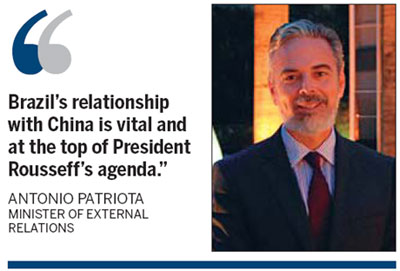Enhancing mutual opportunities
Updated: 2011-09-13 07:51
(China Daily)
|
|||||||||||

Brazilian Minister for External Relations Antonio Patriota acknowledges "there is a very visible and mutually beneficial relationship between Brazil and China - but we would like to make this more sophisticated so that we can both benefit even further".
The relationship already includes bilateral trade worth $56 billion last year, an increase of 52 percent over 2009. Since 2000, Brazil's exports to China have increased 18 fold.
The question is: where do these two countries take their trade relationship from here?
Brazil wants to be seen as a land of opportunity and not just as a commodities warehouse. A recent deal with Embraer jets could mark a significant change, but Patriota said there needs to be more similar and bigger deals on the horizon, including local production lines in China.
Sergio Amaral of the China-Brazil Business Council noted that "Chinese investments are now the strongest inward investments in Brazil".
"Earlier investments were made by China to ensure the supply of basic products that China needed, but now these investments are starting to diversify and you can see the change in the nature of their investments," he said.
There are many areas of the Brazilian economy that are open to investment and offer a shared future with the Chinese.
With Brazil set to host the soccer World Cup in 2014 and the Olympic Games in 2016, the country could learn a great deal from China and the Chinese could find themselves welcomed with open arms if they look to invest in Brazil's necessary infrastructure development.
Likewise recent deals in the mining and energy sectors (see S4) seem to show that in partnership the two countries will achieve more than simply buying and selling what each other needs.
Amaral pointed out that partnership is the key to success. This partnership needs to be garnered not only by the top corporations, but also at a small and medium-sized level.
One positive example of investment going from Brazil to China and successful partnering with the Chinese government has been in the education sector (see S6). The auspicious beginning shows how the two countries can grow their economies by becoming more interdependent and building on each other's strengths.
Nelson Marquezelli, a deputy in Brazil's Federal Parliament, said "both (countries) have the potential to become world economic powerhouses for a long time to come if we work together in a mutually beneficial way".
By looking at the whole spectrum of the economy, when both Brazil and China find areas of mutual benefit and realize the potential they hold within their grasp, the benefits for both economies will far surpass what has been achieved to date.
China Daily
(China Daily 09/13/2011 page25)
Hot Topics
Libya conflict, Gaddafi, Oil spill, Palace Museum scandal, Inflation, Japan's new PM, Trapped miners, Mooncake tax, Weekly photos, Hurricane Irene
Editor's Picks

|

|

|

|

|

|







